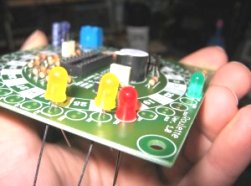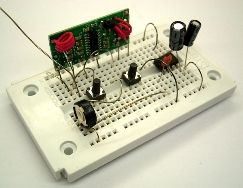Categories: Practical Electronics, About electricians and not only
Number of views: 53989
Comments on the article: 2
Where to start studying electronics
Electronics is like a hobby. Crisis of the genre?
 Many of those who turned electronics into an entertaining pastime often ask themselves the question: “Why am I doing this?” I read magazines and books from the section “Electronics is Simple” and other literature from the series “For Dummies”. More sophisticated and clever books simply lack patience.
Many of those who turned electronics into an entertaining pastime often ask themselves the question: “Why am I doing this?” I read magazines and books from the section “Electronics is Simple” and other literature from the series “For Dummies”. More sophisticated and clever books simply lack patience.
And then the reasoning goes approximately along this line: here, they say, made a simple amplifier, collected several flashing lights (light effects), Charger. But it turns out that all this can be bought, if not new, then at least used, and it will turn out to be of better quality, in branded cases, even in working condition. The question is, where is the benefit, the economic effect of such occupations?
But perhaps you should not bother with such thoughts. After all, there are many examples that do not bring any benefits. These activities are called hobbies, i.e. a hobby in which one should hardly look for meaning. This is like love, because few people can answer what its meaning is. Or fishing, it’s easier to go to the store and buy fish than to stand with a fishing rod near the river and feed the “angry mosquitoes”. So such fishermen simply can not be counted. The same can be said of hunters: the duck obtained is small in size - much less than the purchase.
So is electronics, the hobby of which at a young age comes simply out of curiosity: how does it work, and why does it work this way and not otherwise? In addition, science is not simple, it requires a lot of effort to study the theory, create the first working devices, and subsequently, with experience, develop their own circuits and repair industrial equipment.
Serious toys
One of the "incomprehensible" areas in amateur electronics can be considered robotics. Designs of such "robots" most often represent a small cart that can go around obstacles, move along a given route and can be controlled from the control panel. True, such creativity is most characteristic of Western amateur radio enthusiasts; in the CIS countries this is not so readily done.
It would seem that such a thing? The uninitiated, upon seeing the final result, simply says: “So what?”. And for those who are doing this in all seriousness, this topic is so close, important and understandable that in this area you can find not one or two forums on the Internet, and even download books, often in English, on this topic.
And in fact, if you look, the device of the "robots" deserves attention. After all, control circuits are most often built on microcontrollers, even the simplest ones, but you should start with a simple one. At first, the “inventor” practices writing simple and short programs (no controller will work without a program), and then goes on to complex and large ones. After all, you can learn programming only by starting to write your own programs. well, if at that moment there will be a person nearby who can explain where to start, why all this programming is needed.
Amateur electronics is one way to work your head and hands. After all, you will have to learn not only to solder well, often you also have to do locksmith operations so that everything works out at the highest level. Solve the problems that other people solve by simply going to the store, but I did it myself. This is another reason to enjoy electronics as a hobby.
Quite often it happens that this particular hobby smoothly passes into your favorite profession. And, apparently, the ancient Chinese thinker Confucius was right, who said something like this: “If you choose the work you like, then you will not have to work a day in your life.”Probably, in this saying it was meant that the word work is the same root with the word slave.
So, a person after thorough deliberation, even under the influence of his good friends, may have decided to take up electronics in his free time and turn it into his hobby: there are not only bad, but good examples that are infectious. This solution immediately causes the appearance of a number of problems that would seem insoluble. Here are just some of them.
How to organize a workplace
Such a problem is quite simply solved in modern private houses, where a small corner to put a table can be found anywhere: in the garage, in the basement, in the pantry, in the room and maybe even in the attic. The situation is somewhat more complicated in an apartment building, but if relatives can understand how serious and useful this hobby is, there will always be a free corner in one of three or even two rooms.
If the enthusiasm for electronics does not stop and does not wither away at the very beginning, but succeeds, then over time, an amateur electronic engineer to do what he loves can rent a room, open his repair shop, turn a hobby into a favorite profession. There are a great many such specialists at present.
Most often, they begin to deal with electronics like this: a ready-made circuit is taken, parts, tools are purchased, and forth. The soldering iron is picked up, the very first circuit is assembled, it turns on, cheers, it worked!
The first success leads to the transition to the repetition of other finished schemes. But sometimes it happens differently: the assembled circuit did not work, attempts to “revive” its results did not bring, and soldering irons, parts are thrown into the far corner, sometimes forever. Therefore, the first schemes should be simple, which begin to work immediately. In this regard, we can recommend the classic electronics circuit. First of all, these are generators, on the basis of which you can collect "tweeters and emergency lights."
The first earned scheme just inspires. But, so that the fascination with electronics does not turn into torment, you should study the theory, at least the very basics.
Where to get theoretical knowledge
If a person in high school studied well enough, he remembered Ohm's law and several other basic laws of physics. Not bad, if mathematics was a favorite subject. And if you managed to master the English language as well, then it’s perfectly fine: most of the modern technical documentation is in English. It is these academic disciplines that make one wonder how all this electronics is arranged, and eventually turn it into a hobby.
And do not think that without a special higher education nothing will work at all. At one time, Radio magazine called many of its authors and readers “engineers without a diploma,” so well they knew the circuitry of various devices and assembled good designs. In general, there are still a lot of magazines, for example, the Ukrainian Radioamator, the Belarusian Radiomir, the Russian Circuit Engineering and the Repair of Electronic Equipment.
In the journal "Radio Designer 03 - 2011" there is a whole article about the use of used radio parts, which is very useful for beginner radio enthusiasts. It also gives recommendations for checking parts and a warning that an attempt to “assemble” a transistor from two diodes, which beginners sometimes try to do, will not lead to a positive result, although when checking the transistor looks exactly like two diodes. Well, almost like the classics: "The motor was very similar to the real one, but it didn’t work."
In other literary sources, on the contrary, the authors do not recommend the use of details of dubious origin. It is better to find a way to make money on something, and buy parts for experiments. Perhaps this opinion is more correct.
Electronic magazines
 An example is the electronic journal “Radiolotsman”.It is the last three words that are enough to type in the search line, for example, Yandex, to get acquainted with its contents, and even download individual numbers or even a binder for the whole year. The contents of the magazine are quite diverse and interesting.
An example is the electronic journal “Radiolotsman”.It is the last three words that are enough to type in the search line, for example, Yandex, to get acquainted with its contents, and even download individual numbers or even a binder for the whole year. The contents of the magazine are quite diverse and interesting.
Magazines, of course, are good, but books should not be forgotten. On the Internet you can now find almost any literature, including technical. Many of these books have already become museum exhibits, for example, amateur radio guides dating back to the second half of the last century. In them you can not only trace the history of the development of amateur radio, but also find a lot of useful information that has still not lost its relevance.
One of the best books on electronics should perhaps be considered “The Art of Circuit Engineering” by P. Horowitz and W. Hill. The latest edition of this entertaining three-volume was published in 1993.
The book tells about almost everything that was used at that time and continues to be used until now. At the same time, the authors, even the most complex schemes, explain simply what is called “on the fingers” using the minimum number of formulas. The book contains many practical schemes with examples of their calculations. The text of the book, designed for the general reader, is quite simple and friendly, contains a certain amount of humor. Therefore, one should not be afraid of reading this three-volume.
With the same name, there are several books by other, more modern authors, which can also be downloaded on the Internet or bought a paper version in an online store. In these books you can find information on the modern element base, because electronics is developing faster than all other areas of science and technology.
Boris Aladyshkin
See also at i.electricianexp.com
:
